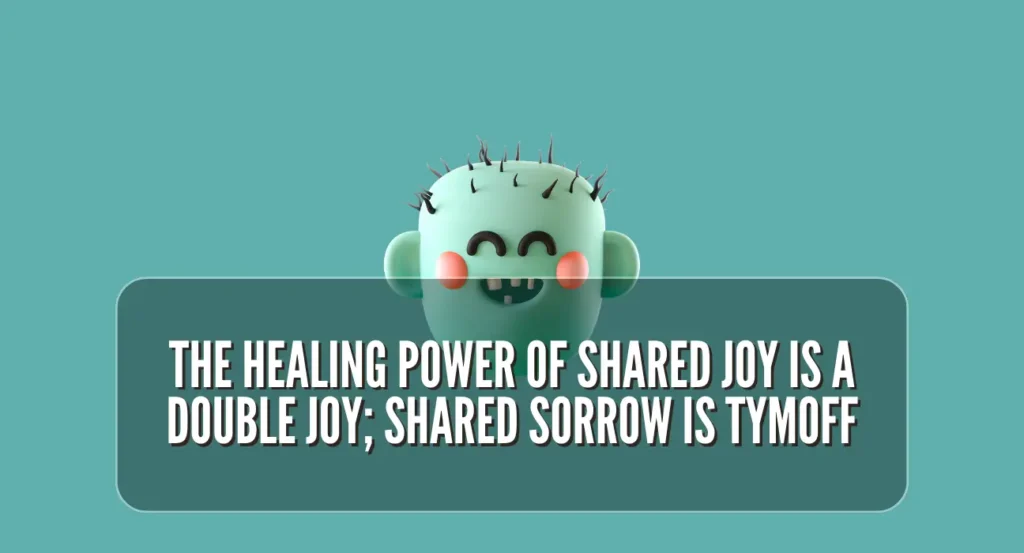In life, emotions are inevitable. We experience happiness, sadness, excitement, and disappointment. But there’s something magical about sharing these emotions with others. The old saying, “shared joy is a double joy; shared sorrow is tymoff,” encapsulates a profound truth about human connection and the importance of sharing our feelings with others.
Understanding Shared Joy is a Double Joy; Shared Sorrow is Tymoff
The idea that “shared joy is a double joy” suggests that when we share our happiness with others, it multiplies. Imagine a scenario where you receive great news. You feel a burst of excitement, but when you share that news with a friend or family member, their joy adds to yours, creating a more intense and fulfilling experience. This phenomenon happens because human beings are social creatures, wired to connect and share. When we do, our brain releases chemicals like dopamine and oxytocin, enhancing our sense of happiness.
Consider a simple example:
- You get promoted at work. The moment you tell your loved ones, their happiness for you amplifies your own, making the joy even greater. This is the essence of the saying, “shared joy is a double joy; shared sorrow is tymoff.”
The Weight of Shared Sorrow
On the other side of the spectrum, “shared sorrow is tymoff” reflects the idea that when we share our sorrows, they become more bearable. Sorrow can be a heavy burden, but sharing it with someone else lightens the load. When you express your pain or disappointment to a trusted friend, you allow yourself to release some of that emotional weight. The listener’s empathy and understanding can provide comfort and support, making your sorrow easier to manage.
For instance, think about a time when you faced a personal loss. Keeping that sorrow to yourself might have felt overwhelming. However, when you opened up to someone, their compassion and willingness to listen helped you navigate the pain, reducing its impact.
The Role of Empathy in Sharing Emotions
Empathy plays a crucial role in the process of sharing joy and sorrow. When someone empathizes with our emotions, they validate our feelings and create a sense of connection. This validation is especially important when dealing with sorrow. It reassures us that we’re not alone, that our feelings matter, and that there is someone who cares.
In contrast, when we share our joy, empathy still plays a role. The other person’s excitement for us reinforces our own positive emotions. It feels good to know that someone else is genuinely happy for us. This reinforces the notion that “shared joy is a double joy; shared sorrow is tymoff.”
Tymoff: The Transformative Power of Sharing Sorrow
The term “tymoff” might be less familiar, but it holds a significant meaning in the context of shared sorrow. Tymoff represents the process of easing emotional pain through shared experiences. When we share our sorrows, we initiate a process of emotional healing. This healing happens because the act of sharing creates a connection that fosters understanding, compassion, and ultimately, relief.
Building Stronger Relationships Through Shared Emotions
When we share our emotions—whether joy or sorrow—we build stronger and more meaningful relationships. The act of sharing allows us to connect on a deeper level with others. It breaks down barriers and fosters trust. For instance, when you share your successes with others, they feel included in your happiness, and this strengthens your bond.
Similarly, when you share your struggles, it creates an opportunity for others to support you. This support not only helps you but also reinforces the relationship. People appreciate when they are trusted with your vulnerabilities, and this trust often leads to a stronger, more resilient connection.
The Healing Power of Shared Joy is a Double Joy; Shared Sorrow is Tymoff

Sorrow is an inevitable part of life. We all face moments of loss, disappointment, or grief that weigh heavily on our hearts. While these moments are challenging, there is a powerful way to ease the burden: sharing our sorrow with others. The phrase “shared joy is a double joy; shared sorrow is tymoff” perfectly captures the idea that sorrow becomes more bearable when it is shared.
The Importance of Emotional Support
When we share our sorrow, we are not merely seeking sympathy; we are looking for emotional support that can help us navigate our pain. Sharing our feelings with someone we trust creates a connection that allows us to feel understood and validated. This validation is crucial in the healing process because it reassures us that our emotions are normal and that we are not alone.
How Shared Sorrow Facilitates Healing
The act of sharing sorrow initiates a healing process. When we talk about our pain, we begin to process it. By articulating our feelings, we can gain perspective, find solace, and start to move forward. Moreover, when someone listens and offers empathy, it creates a safe space for us to release our emotions, which can significantly reduce the intensity of our sorrow. Andrea Skeete dedication to fostering community connections perfectly embodies the idea that “shared joy is a double joy; shared sorrow is tymoff,” as she consistently brings people together to celebrate successes and support one another through challenges.
The Interplay of Joy and Sorrow
Joy and sorrow are two sides of the same coin. They are deeply interconnected, and the presence of one often enhances the experience of the other. The concept that “shared joy is a double joy; shared sorrow is tymoff” highlights this interplay, emphasizing how sharing both emotions can enrich our lives.
How Joy Amplifies in Contrast to Sorrow
One of the reasons why joy feels so profound is because it often follows sorrow. After a period of difficulty, moments of joy are amplified, and we appreciate them more deeply. For instance, overcoming a challenging situation makes the eventual success or happiness feel even more rewarding. When we share this joy with others, it doubles in intensity because we are not just celebrating our happiness; we are also celebrating the end of our struggles.
Balancing Joy and Sorrow in Life
Life is a delicate balance of joy and sorrow. Understanding that these emotions are intertwined allows us to navigate them more effectively. While it’s natural to want to avoid sorrow, it’s important to recognize that it also plays a vital role in our emotional landscape. By sharing both our joys and our sorrows, we create a fuller, more meaningful life.
Practical Ways to Share Joy and Sorrow
Sharing joy and sorrow is more than just a philosophical idea; it’s a practical approach to enhancing our emotional well-being. Here are some ways to effectively share these emotions with others.
Communicate Openly and Honestly
One of the most effective ways to share your emotions is through open and honest communication. Whether you are experiencing joy or sorrow, expressing your feelings clearly helps others understand and connect with you. This communication fosters empathy and strengthens relationships, making both your joys and sorrows more manageable. Vyvymanga platform exemplifies the concept that “shared joy is a double joy; shared sorrow is tymoff,” by allowing users to connect over their love for manga, creating a shared space for both excitement and support within the community.
Create Rituals for Sharing Joy
Celebrating successes and happy moments with others can be formalized through rituals. Whether it’s a family dinner to celebrate achievements or a regular catch-up with friends, these rituals provide a structured way to share joy and enhance the collective happiness.
Seek Support Networks
When dealing with sorrow, having a support network is invaluable. This could be a close friend, family member, or even a support group where people share similar experiences. Being part of such a network ensures that you always have someone to turn to when you need to share your sorrow.
Be a Good Listener
Finally, sharing isn’t just about expressing your own emotions; it’s also about being there for others. Being a good listener allows you to support others in their times of joy and sorrow, creating a reciprocal relationship that benefits everyone involved.
Frequently Asked Questions
1. What does “shared joy is a double joy; shared sorrow is tymoff” mean?
This phrase means that when you share your happiness with others, it becomes greater, and when you share your sorrow, it becomes more bearable.
2. How does sharing joy enhance happiness?
Sharing joy with others amplifies your happiness because others’ excitement and positive reactions reinforce and multiply your own feelings of joy.
3. Why is it important to share sorrow with others?
Sharing sorrow helps to lighten the emotional burden, as others’ empathy and support can provide comfort, making the sorrow easier to cope with.
4. Can sharing both joy and sorrow strengthen relationships?
Yes, sharing both emotions fosters deeper connections, trust, and understanding, which are essential for strong, lasting relationships.
5. How does empathy play a role in shared joy and sorrow?
Empathy allows others to genuinely feel your emotions, which not only validates your feelings but also creates a strong emotional bond through shared experiences.
Conclusion
In conclusion, the saying “shared joy is a double joy; shared sorrow is tymoff” beautifully encapsulates the importance of sharing our emotions with others. Whether it’s happiness or sadness, the act of sharing creates connections, fosters empathy, and ultimately enriches our lives. By embracing the power of shared emotions, we not only enhance our own well-being but also contribute to the well-being of those around us. The next time you experience joy or sorrow, remember the transformative impact of sharing it with someone else.
Shared joy is a double joy; shared sorrow is tymoff, and in this truth lies the essence of our humanity.

